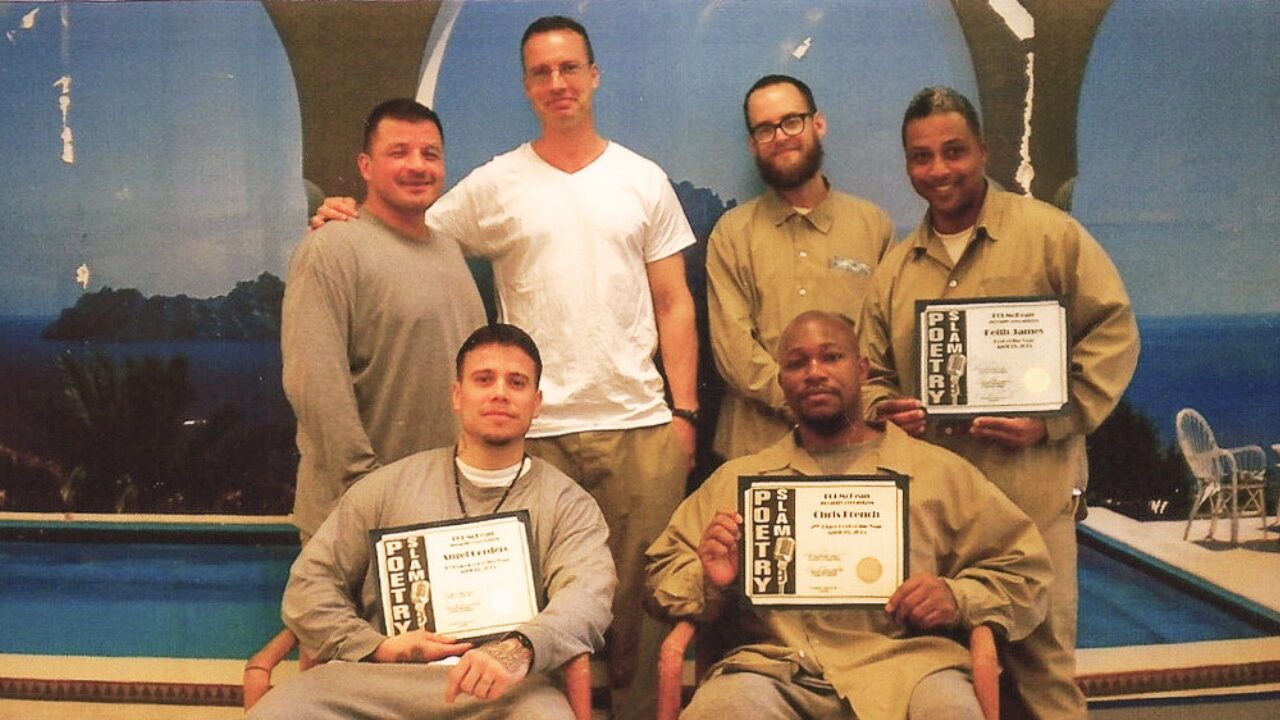To look at Adam Clausen today – the successful life and fitness coach, the man building a fund to provide affordable housing for thousands of formerly incarcerated citizens – you would never guess that he was once sentenced to spend 213 years in a federal prison. He’s a far cry from the scared, traumatized, desperate young man who committed the crimes for which he was prosecuted more than two decades ago: a series of robberies over a span of weeks.
While incarcerated, Adam faced a choice. “Either give up,” he says, “or focus on earning my second chance by doing something truly extraordinary.” He chose the latter, devoting himself fully to the work of self-improvement, and, even more critically, of helping others.

A group of men incarcerated at Federal Correction Institution, McKean in Bradford, Pennsylvania celebrate winning a poetry slam competition organized by the University of Pittsburgh at Bradford’s English Department.
He found mentors who encouraged his interest in fitness. He completed more than 100 Federal Bureau of Prisons rehabilitation programs. He became a fitness instructor and life coach. He founded a program that helped hundreds of other incarcerated people learn skills to counsel their peers in fitness, substance abuse, and overall health. Within the prison walls, he became a model citizen and a powerful force for good.
In the midst of all this, Adam’s future wife, Roseanne, walked into his life. Roseanne, known by most as “Ro,” accompanied a friend on a prison visit and was introduced to Adam. They kept in touch, and, in a short time, Ro became Adam’s closest confidant and fiercest advocate. They dreamed of a life together on the outside. Through every setback – including a denied clemency petition in 2016 – they never gave up hope.

Ro travels from New Jersey to White Deer, Pennsylvania to visit Adam at the United State Penitentiary, Allenwood. The two spent time together making wooden gifts to donate to children at a local charity in time for Christmas.
In August of 2020, their faith was rewarded. Because of provisions in the First Step Act, signed into law by President Trump, he was able to qualify for “compassionate release,” owing to “extraordinary and compelling circumstances.” He was granted immediate release. “This is what everybody in prison dreams about,” he says.
Adam and Ro were ready for a fresh start. They packed the car and headed west to Las Vegas, where Adam had a job waiting for him. The only problem: They didn’t have an apartment yet. While Ro drove, Adam used a smart phone to search for available places. He marveled at the phone’s advanced technology and tried to get the hang of it.
Whenever he spotted an apartment that met their needs, he’d submit an application, along with the $100 fee. The first denial arrived without delay. Then another. Then another. He decided to take his name off the application, leaving only Ro’s. Almost immediately, it got approved. Adam had glimpsed the reality of his post-incarceration life – no longer imprisoned, but not exactly free, either.
It wasn’t just the criminal record holding him back; it was the fact that he had been placed on federal supervised release.
Federal supervised release is served after prison time ends. When it was first designed, it was intended to look after people with a high risk of reoffending. But in practice, almost everyone sentence to federal prison also gets placed on supervised release, which helps explain why, according to the Bureau of Justice Statistics, the supervised release population has grown nearly 300% in the past few decades. Regardless of their particular circumstances, people on supervised release live with the fear that one minor slip-up away from being sent right back to prison.
So it was with Adam. “My past far outweighed what I had done in prison,” he says. “It was more about my crimes than about what I had accomplished.” Still, he did what he had to do. He had daily check-ins with his probation officer. He took regular drug tests; lacking a driver’s license, he relied on Ro to get him there. He and Ro bore this struggle together, diligently building a life on the outside. Adam lived with the continued stress of his supervision. And Ro shared the same anxiety, always fearing that Adam was one mistake away from being sent back to prison for life.

As Director of Innovation and Social Impact at Social Purpose Corrections, Adam Clausen works to modernize America’s approach to prison education and programming. His focus is on creating genuine opportunities for second chances when people return home.
This is how taxpayer dollars were spent: supervising Adam Clausen, a man who had become a mentor to others, a citizen who hadn’t had an incident report in prison for nearly two decades. It’s hard to imagine how society was made safer by this arrangement.
In July of 2021, Adam and Ro welcomed a son, Christian, into the world. “We couldn’t have been any happier,” he says. But the happiness was shadowed by the awareness that Adam remained on supervision, and everything they had built together – the new life, the growing family – could be taken away. “It was fragile,” he says. “I felt like I could be ripped back to prison. So that’s part of the mental component of being under supervision, of still feeling like there’s this chance you can go back to prison at any time. And once I had a son, that was a huge responsibility.”
Not long after the birth of his son, Adam applied for early termination of his supervision term. Surely, he thought, the system would recognize his progress. The application was denied, and Adam spent the remaining fourteen months of his term under the intense scrutiny of federal supervision. He was a dutiful father, but supervision made it hard for him to do all the things a father wants to do. His ability to travel was limited, and spontaneous weekend trips were out of the question.

Today, Adam is off supervision and putting his experience to good use. He’s the director of innovation and social impact at Social Purpose Corrections, a nonprofit dedicated to transforming correctional and reentry culture. And, alongside his dear friend Charles “Duke” Tanner, a man pardoned by President Trump from a life sentence, he co-founded Legacy Impact Group, which works to provide housing and mental health support to formerly incarcerated people.
Adam knows firsthand what people leaving prison need. Not complicated rules designed to trip them up, but real resources and support. For Adam, the number one thing people leaving prison need – the foundation for everything else – is “a safe, stable environment…where you know where you’re going to lay your head at night.” Together, Adam and Duke are committed to making sure that “reintegration is as smooth and seamless as it can be.”
To further support this work, Adam is lifting his voice in support of policy change at the federal level. He is a staunch supporter of the Safer Supervision Act, a bill pending reintroduction in Congress, which would establish a presumption of early termination for people doing all the right things: people like Adam. And it would take individualized approaches to supervision, treating people on supervision as human beings first, each with their own unique set of risks and needs.

This, ultimately, is what Adam’s fight is all about. It wasn’t until he was in a federal prison that he found mentors who inspired his belief in himself. Now Adam wants everyone, both inside and outside of prison, to develop the skills they need to thrive. He’s excited to pass on everything he’s learned. He knows it will take a lot of hard work to make his vision a reality, but he made a decision a long time ago. Giving up isn’t an option. It’s time to do something extraordinary.
